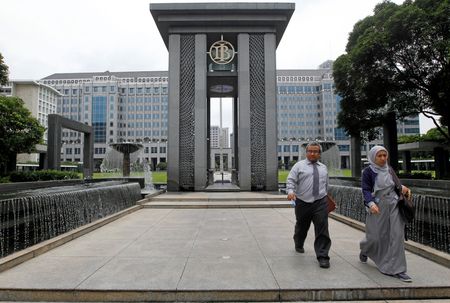JAKARTA (Reuters) -Indonesia’s central bank said it had agreed on a “burden sharing” arrangement with the government where it will raise the interest rates it pays on government deposits as a way to help the government fund its programmes.
In a statement on Thursday, Bank Indonesia spokesperson Ramdan Denny Prakoso said the arrangement was intended to help the government cover the cost of raising funds through the bond market for programmes such as affordable housing and setting up cooperatives in villages.
The statement came after Governor Perry Warjiyo told a parliamentary hearing earlier this week that BI and the government would share the interest distribution on government programmes.
“To reduce the interest expenses on economic programmes … BI has agreed to share the burden with the government,” Ramdan Denny said.
“The increase in interest rates that BI pays to the government will be consistent with the monetary programme for economic stability, and will be in synergy to provide fiscal space to support economic growth and reduce the burden on the people,” he said.
Ramdan Denny said the “burden” would be calculated by evenly splitting the cost of funds on bonds issued for the housing and villages programmes, after deducting any interest the government earns on its deposits with domestic financial institutions.
BI has also bought 200 trillion rupiah ($12.3 billion) of government bonds in the secondary market, including 150 trillion rupiah through a debt switch with the government, he said, describing this as a policy that will also support government programmes but separate from the burden sharing agreement.
At the parliamentary hearing earlier this week where the arrangement was first outlined, Finance Minister Sri Mulyani Indrawati said the central bank remained independent of the government.
For the village cooperative programmes, Sri Mulyani said the government will move some of its money from a deposit account at BI and place it with state-owned banks at a 2% interest rate. The state banks could then use the funds to lend to cooperatives with lending rates capped at 6%, she said.
The deal is expected to have a limited liquidity impact as it does not involve BI purchasing government bonds directly, brokerage Mandiri Sekuritas chief economist Rangga Cipta said, adding that the placement of government money in state banks “may have a positive effect on money supply”.
BI is also expected to cut policy rates by another 50 basis points for the remainder of 2025, Rangga said, on top of 125-bp cuts the central bank has made in the current monetary easing cycle.
($1 = 16,250 rupiah)
(Reporting by Gayatri Suroyo; Editing by John Mair and Sam Holmes)











